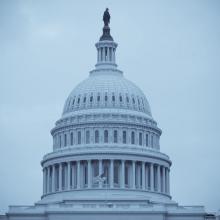Russia
Ten days before Donald Trump's inauguration, the former mayor of Hiroshima sent the president-elect a letter calling on the incoming U.S. administration to lead on nuclear non-use in Northeast Asia.
"Keenly aware that your decisions on matters related to nuclear weapons will affect everybody in the world and especially those of us living in Hiroshima, we, Hiroshima citizens and hibakusha (A-bomb survivors), expect these decisions to be wise and peaceable," Tadatoshi Akiba, Hiroshima's former mayor, wrote.

Image via www.GlynLowe.com/flickr.com
On Jan. 11 the Senate confirmation hearing for former Exxon Mobil CEO Rex Tillerson, for the office of Secretary of State, began, reports NPR. In his hearing Tillerson admitted to the Senate Foreign Relations Committee that he has yet to discuss with President-Elect Trump U.S. foreign policy as it regards to Russia.
He also made a statement that seemed in partial opposition to the use of sanctions against Russia and other countries, stating that they “are going to harm American businesses.” However, he relented to the idea that sanctions have the ability to be a “powerful and important tool.”

Image via Joseph Sohm/ Shutterstock.com
He referred to himself as “the greatest job producer that God ever created.”
I sat on the first wooden pew of the Metropolitan AME Church in Washington, D.C., on New Year’s Eve, with 500 faithful from across the country and thousands who watched online, to worship, testify, and encourage each other.
We came together in the tradition of the 1862 “watch night” service, when enslaved and free African-Americans, abolitionists, and others awaited news that the Emancipation Proclamation would become law and would free black people living in the South. We came together also in the tradition of Jesus, who told his disciples to “keep awake” while he prayed on the night before his crucifixion.
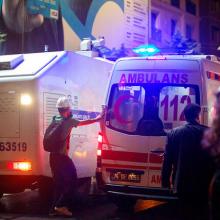
Image via Gregg Carlstrom/flickr.com
On Dec. 19 the Russian ambassador to Turkey Andrei Karlov was assassinated in Ankara, Turkey, reports Reuters. The ambassador was giving a speech at an art gallery when a gunman fatally shot him. Three other people were also wounded and the gunman appears to have been killed.
“Don’t forget Aleppo, don’t forget Syria!” the gunman shouted after the shooting.
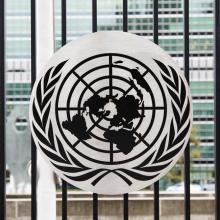
Image via Osugi/Shutterstock.com
On Dec. 19 the United Nations Security Council unanimously voted to send UN observers to Aleppo to oversee the evacuation of civilians, reports Al Jazeera. UN observers will travel soon to Aleppo as will personnel who can administer aid.
“For the first time in numerous attempts to get unanimity on the situation on Aleppo, all of the 15 UN Security Council members have supported this resolution to send UN monitors in Aleppo,” said journalist Mike Hanna.
Donald Trump’s pick for secretary of state, ExxonMobil CEO Rex Tillerson, has come under fire for his friendship with Russian president Vladimir Putin – who is suspected of trying to tip the election to Trump – his lack of diplomatic experience, and the fact that he is a corporate bigwig who champions fossil fuels, even as the threat of global warming grows.
But Tillerson, whose nomination was announced on Dec. 13, may also face criticism from an unexpected quarter – social conservatives whose support was critical to Trump’s unexpected election last month.
On Dec. 11, a bipartisan group of senators — including Republican Sens. John McCain and Lindsey Graham, and Democratic Sens. Chuck Schumer and Jack Reed — released a joint statement announcing their intent to investigate whether Russia swayed, or attempted to sway, the 2016 U.S. presidential election to elect Donald Trump.
On Dec. 12, Senate Majority Leader Mitch McConnell announced his support for their efforts and stated that the Senate intelligence committee should lead the investigation, reports Politico.
Donald Trump’s victory in the 2016 presidential election has few parallels in the history of contemporary politics in the Western world.
But the closest one is familiar to me: Silvio Berlusconi, the media tycoon who was elected prime minister of Italy — my homeland — for the first time on March 27, 1994 and who served four stints as prime minister until 2011.
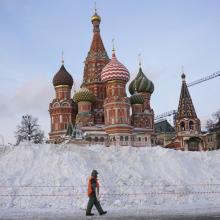
Image via REUTERS/Maxim Zmeyev/RNS
Several American-based religious denominations remain defiant in the face of new laws that would ban them from proselytizing in Russia.
The so-called “Yarovaya laws” make it illegal to preach, proselytize, or hand out religious materials outside of specially designated places. The laws also give the Russian government wide scope to monitor and record electronic messages and phone calls.
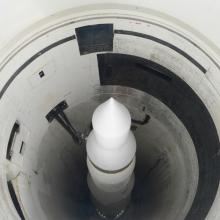
Image via Zack Frank / Shutterstock.com
In the historic port city of Yalta, located on the Crimean Peninsula, I visited the site where Churchill, Roosevelt, and Stalin, in February of 1945, concluded negotiations ending World War II.
These leaders and their top advisers were also present at the creation of the United Nations and other instruments of international negotiation and non-military cooperation. Tragically, the creation of the “Cold War” was underway soon after.
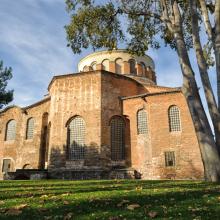
Hagia Irene church. Image via Salparadis / Shutterstock.com
A religious summit last held more than 1,200 years ago suddenly risks being downgraded or postponed because of Syria’s four-year civil war. This unexpected twist has come as the world’s Orthodox churches, the second-largest ecclesial family in Christianity, were supposed to be only months away from their first major council since 787.
Now it is no longer clear when or where the Holy and Great Council of the Orthodox Church, a summit first proposed at least as far back as 1961 and provisionally scheduled for May in Istanbul, will be held.
With its traditional icons and complex liturgies, Orthodox Christianity can seem like an unchanging remnant of a long-lost era. But it lives very much in today’s world and its 14 autocephalous (independent) member churches can be wrapped up in its politics and subject to its pressures.

Image via Adwo / Shutterstock
The Syrian crisis is escalating in unnerving ways with the arrival of Russian troops and the beginning of direct Russian military intervention. What had been a local and regional humanitarian disaster now risks becoming a superpower confrontation between Russia and the United States. Undoubtedly the introduction of Russian firepower on the scene will bring more civilian suffering, dislocation, and death.
If I were looking for handles for prophetic preaching on the Syria situation, I might select the following.
In the wake of international criticism over Moscow’s role in ongoing violence in Ukraine, the U.S. on June 10 called on Pope Francis to take a stronger stance on the conflict in his meeting with Russia’s president, Vladimir Putin.
“We think they could say something more about concern on territorial integrity, those type of issues,” U.S. ambassador to the Holy See, Kenneth F. Hackett, told journalists in Rome ahead of Putin’s arrival.
THE EXTRAORDINARY film Leviathan takes place in a tiny coastal town on the other side of the world, but it relates to all our dreams and fears.
A man is tormented by bureaucracy, as the authorities try to take his house. He has an unhealthy relationship with alcohol, and a very unhealthy one with his partner. He works on people’s cars, does favors for people who ask him, and tries to raise his son as best he can. And he’s caught between the wheels of historic oppression and emerging forms.
Leviathan, this year’s Russian nominee for the Best Foreign Language Film Oscar, is a work of uncommon cinematic bravery, for the people who made it take on the corruption of their current political masters. Vladimir Putin appears briefly, as a portrait looming over the office of the mayor trying to take our hero’s house. But the graft, selfishness, and cruelty of Putin’s imperial reign are palpably present in the mayor, who has been fighting the householder for years to get his property, for reasons that owe more than a little to the legacy of Soviet-era patriotic ideology. Communism has been replaced by a heady mix of nationalistic pride and elitism religion, whose boundaries are enforced with no mercy. Pussy Riot’s punk prayer gets a mention in a priest’s litany of things that are undermining Mother Russia. It’s the same old story, there and everywhere—keep the nation pure, confuse spirit and law, and wreck your own life by denying the glories of human diversity.
A Russian pastor whose grandfather was killed for being a Christian toured the U.S. recently, studying church ministries and providing a rare, first-person look at Russia’s complex religious landscape after widespread persecution ended.
During Victor Ignatenkov’s youth under the Soviet regime, Christians could meet only for worship.
No Sunday school.
No midweek Bible study.
And definitely no proselytizing.
Today, Ignatenkov, 59, said he’s free to lead whatever activities he wants as pastor of the Central Baptist Church in his hometown of Smolensk — a city situated between the capitals of Russia and Ukraine — and as regional bishop for the Russian Union of Evangelical Christians-Baptist. The union is a group of evangelical Protestant churches that began emerging in Russia about 150 years ago as an alternative to the Russian Orthodox establishment.
“What did you do on your summer vacation?”
Even now students may be answering that question in essays at the start of this new school year. Maybe you wrote such a paper years ago. No matter what you did or where you went this past summer, it was almost impossible to escape the heaviness of the headlines. #BringBackOurGirls has become a distant refrain, almost forgotten beneath the crush of summer tragedies:
Thousands of children traveled alone from Central American countries to enter the U.S. as refugees. Ebola deaths spread to more West African nations killing hundreds including many health workers. The forces of ISIS, intent on carving out an Islamic caliphate, took over major Iraqi cities and beheaded a U.S. journalist in Syria. Russia usurped Crimea and threatened the rest of Ukraine. The U.N. refugee agency announced in late August that “the number of refugees, asylum-seekers and internally displaced people worldwide has, for the first time in the post-World War II era, exceeded 50 million people.” Gaza has been reduced to rubble while Hamas rockets still fly toward Israeli cities. Michael Brown, an eighteen-year-old African American man who might have started college this week, was shot and killed by a white police officer in the waning days of August.
After such a summer, how can we do anything but scoff at Paul’s words from Romans?
A soon-to-be college-bound Michael Brown is shot by Missouri police, reportedly while holding his hands above himself in surrender and while unarmed. The resulting protests turn violent, leading ultimately to police setting up barricades, complete with snipers, tear gas, and flash grenades. Local stores are decimated and scores are injured in the resulting tensions.
Not long ago, Eric Garner, another African-American man, died of suffocation while being submitted to a choke submission hold by a New York policeman.
Last year in North Carolina, a black man was shot 10 times by a policeman. And all of this is in the shadow the Trayvon Martin, whose tragic and unnecessary death, is still fresh in our minds and hearts.
As cited on the Economist website , it’s enough to elicit a grim question from Delores Jones-Brown, director of the John Jay College on Race, Crime and Justice. “People are asking,” she says, “Is it open season on us?”
Meanwhile, half a world away in Iraq, ISIS continues to wreak havoc, and the United States has resumed an airstrike campaign after a decade of military force trying to maintain a tentative peace in a fractured nation. Hardly a day goes by when we don’t have reports of more Israeli and Palestinian blood spilled over the historic Gaza conflict, and Russian President Vladimir Putin continues to — in the words of a recent TIME Magazine article — “create problems only he can solve.” All the while, he stokes resentments between east and west not seen since the Cold War, seeking, too, to weaken the cohesive strength of NATO and to drive a wedge between the United States and its allies in Europe.
What’s happening to us?
THE KENNAN DIARIES, carefully edited by Frank Costigliola, a University of Connecticut historian, covers an amazing and sometimes disturbing 88-year period of personal journal-writing by George F. Kennan, who became the most famous diplomat-intellectual of the 20th century.
Born in 1904 (he died in 2005) Kennan, a Milwaukee native, grew up in an upper-class Scotch-Irish Presbyterian family with three older sisters and a father who was a tax attorney.
After graduating from Princeton, Kennan became a Foreign Service officer with the State Department, eventually serving in posts throughout Europe. But Kennan’s first love was Russia. He wrote in his diary that “he had a mystical connection to Leningrad, as though he had once lived there.” He was offered a three-year university stint in Berlin by the State Department—Kennan’s boss wanted him to be educated like a pre-Bolshevik Russian gentleman. Kennan’s grasp of the Russian language and history became exceptional. Together with his prodigious analytical skills, it would be the foundation of his brilliant career.
After 20 years abroad, Kennan fired off his famous 5,540-word “Long Telegram” on Feb. 22, 1946, from Moscow to Washington. Soon afterward, in July 1947, he wrote another piece in Foreign Affairs under the byline “X.” In the two pieces he said that the Soviets under Stalin would try aggressively to expand, but that the U.S. should not employ military means to stop them. Instead, Kennan advocated “containment,” heavily monitoring the Russians with hard-headed diplomacy and tough talk. He also stated that the Soviet Union would eventually self-destruct.
When the Word becomes flesh, when the Son of God becomes one who bleeds, Jesus demonstrates God's humble solidarity with human nature from Adam and Eve onward, to the last person born in history.
This vulnerability of God for us, this identification of Jesus with our collective human frailty, changes our perspective on everything. In the light that shines from the face of Jesus Christ, we at last see God and humanity with 20/20 vision.
Paul comes to this vision late in the day, well after the events of God in the flesh that reconcile the Father to God's creation. The vision of Jesus blinds him but when his eyes are healed, having seen Jesus, he sees God and humanity and the world very differently than he did before the vision of Christ that overwhelms him.
Years later, in a letter to the Corinthians, speaking about the church's worship with blest eyes he writes: "When we drink from the cup we ask God to bless, isn't that sharing in the blood of Christ? When we eat the bread we break, isn't that sharing in the body of Christ?"



